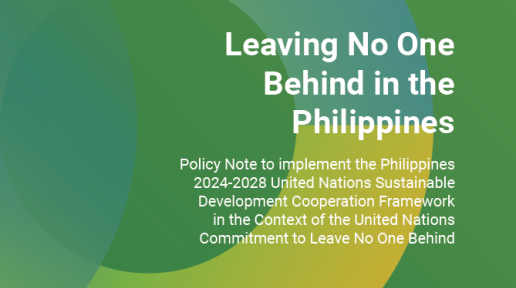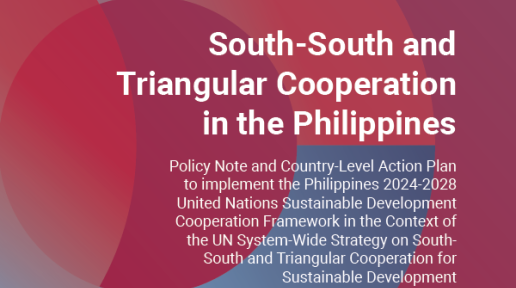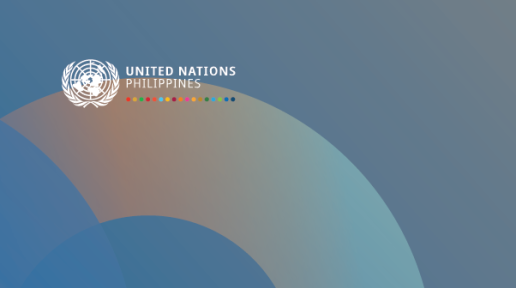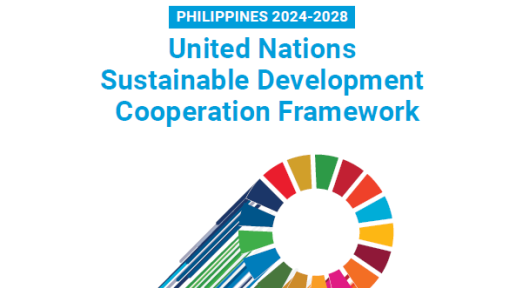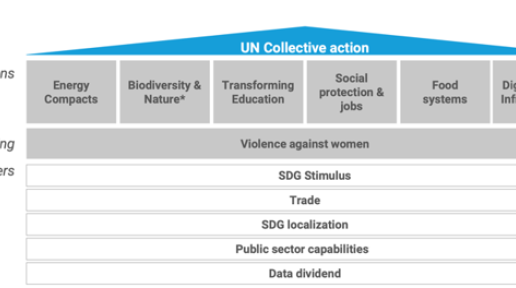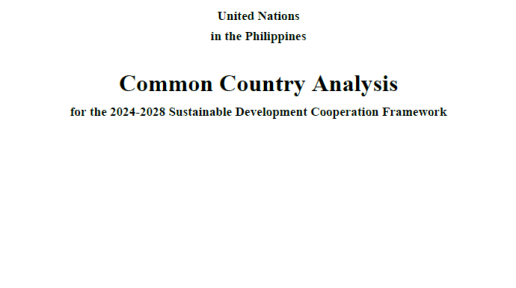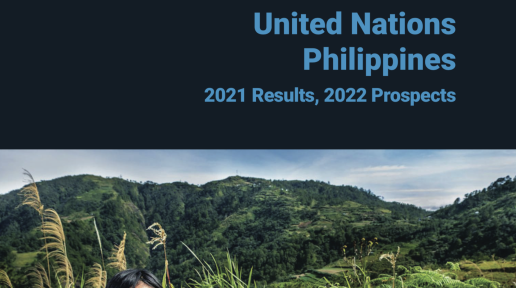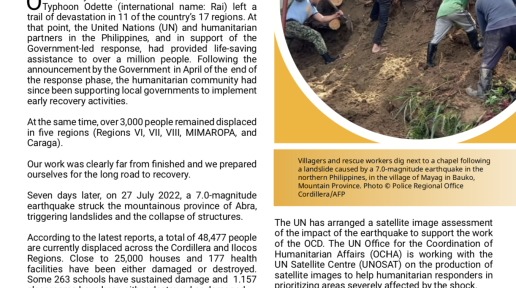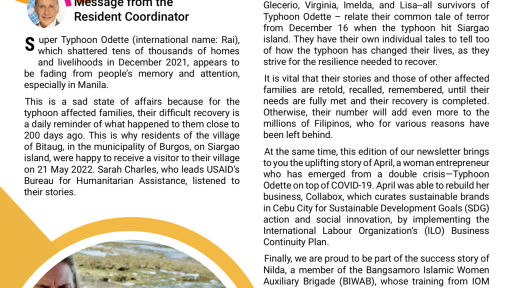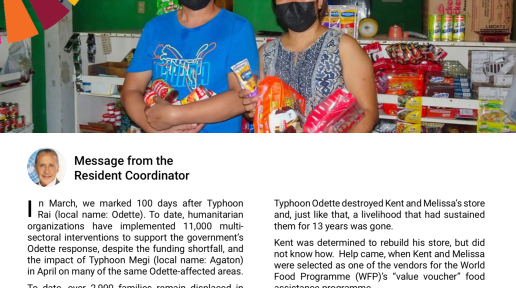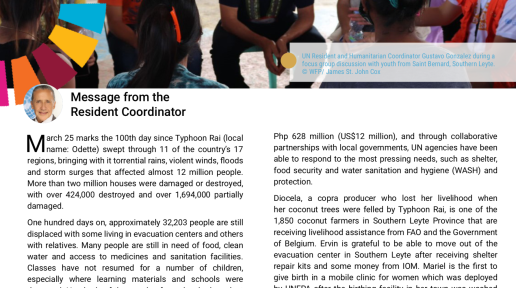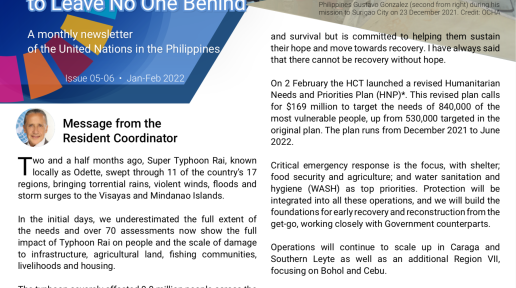Publication
14 October 2025
United for Progress: 80 Years of United Nations Partnership with the Filipino People
This year marks eight decades of global service - a celebration of the UN’s enduring legacy, offering an opportunity to reflect on today’s global challenges and share a vision for the future.The celebration also brings together various stories that were key in capturing the spirit of partnership, collaboration, and unity that marked the beginning of the United Nations’ presence in the Philippines and the country’s historic entry as a founding member state.Through these stories, we witness how the United Nations and the Filipino people came together to rebuild communities, foster peace, and promote sustainable development. Each story reflects a shared commitment to progress and a vision for a better future, built hand in hand, one step at a time.Stories of Partnership with the Filipino People
Click on the links below to read the full stories
Land, Livelihoods, Legacy: IFAD’s Commitment to Indigenous Peoples' Empowerment in the PhilippinesFrom the highlands of the Cordillera to the coasts of Mindanao, this story explores how IFAD have supported in empowering communities to protect their heritage, improve their standard of living, and lead inclusive rural development.
Labour Code: A blueprint for decent workThe Philippines made history in 1974 by enacting Asia’s first Labour Code, a landmark achievement shaped with the guidance of the International Labour Organization (ILO). This enduring legal framework institutionalized workers’ rights, social dialogue, and tripartism, laying the foundation for decent work and social justice. Its legacy continues today, including in the Bangsamoro region, where a new labour code aims to support peace and development.
Breaking barriers, Saving lives: How UNAIDS has helped drafting Philippines' landmark HIV lawsRepublic Act 11166, the Philippines’ landmark HIV law passed in 2018, marked a turning point in the country’s HIV response by allowing minors aged 15 and above to access testing and treatment without parental consent. This life-saving reform was the result of over a decade of advocacy and technical support from UNAIDS, which played a key role in shaping both RA 11166 and its predecessor, RA 8504. The law has since enabled more inclusive, rights-based healthcare, expanded access to preventive treatment, and empowered people living with HIV to lead the conversation.
Building Safer Migration Pathways for Filipino Migrants The International Organization for Migration (IOM) has worked with the Philippine government and civil society for five decades to build safer, more sustainable migration pathways for Filipino workers. From supporting survivors like Angel to helping establish the Department of Migrant Workers, IOM has played a key role in shaping policies, promoting ethical recruitment, and ensuring dignified reintegration for returning migrants.
UNICEF, protecting every child in the Philippines now and then through the power of vaccinesFor over seven decades, UNICEF has been a vital partner in the Philippines’ efforts to protect children through life-saving vaccines. From eradicating polio and maternal and neonatal tetanus to supporting emergency immunization during crises like Super Typhoon Haiyan and the COVID-19 pandemic, UNICEF has helped ensure that even the most vulnerable children are reached. Its recent innovations, such as the DigiVacc digital immunization suite, continue to strengthen the country’s health systems and safeguard every child’s right to a healthy future.
Going beyond Yolanda: Revolutionizing emergency response through family food packsIn the aftermath of Super Typhoon Yolanda, the World Food Programme (WFP) partnered with the Philippine government to revolutionize emergency response through the mechanization of family food pack production. By establishing disaster resource centers and enhancing logistics capacity, WFP helped the Department of Social Welfare and Development (DSWD) preposition millions of food packs nationwide, enabling faster, more efficient disaster relief. This collaboration has since evolved to support social protection programs and build long-term resilience through training and infrastructure, ensuring timely aid delivery during crises.
Three Decades of Peace: UNDP accompanying the Bangsamoro journey for peace and developmentFor over 30 years, the United Nations Development Programme (UNDP) has been a key partner in the Philippines’ journey toward peace in Mindanao, supporting the reintegration of former combatants, transforming conflict-affected areas into Peace and Development Communities, and helping shape the Bangsamoro peace process. From grassroots capacity-building to high-level negotiations, UNDP’s sustained efforts have contributed to turning war zones into spaces of governance, inclusion, and hope.
Forging Progress: How Metals and International Cooperation Power Philippine Industrialization Since the 1960s, the United Nations Industrial Development Organization (UNIDO) has played a pivotal role in advancing the Philippines’ industrialization through its partnership with the Metals Industry Research and Development Center (MIRDC). From establishing specialized laboratories and training centers to providing durable machinery and technical expertise, UNIDO’s support has empowered generations of Filipino engineers and technicians. This enduring collaboration continues to evolve, now focusing on sustainable industrial growth, clean energy, and digital innovation to strengthen the country’s global competitiveness.
UNHCR in the Philippines: Five Decades of Protection, Hope and HumanityFor five decades, UNHCR has partnered with the Philippines to protect refugees, stateless persons, and internally displaced communities. From aiding Vietnamese boat people in the 1970s to supporting Rohingya youth through education today, UNHCR has helped shape the country’s humanitarian legacy.
Click on the links below to read the full stories
Land, Livelihoods, Legacy: IFAD’s Commitment to Indigenous Peoples' Empowerment in the PhilippinesFrom the highlands of the Cordillera to the coasts of Mindanao, this story explores how IFAD have supported in empowering communities to protect their heritage, improve their standard of living, and lead inclusive rural development.
Labour Code: A blueprint for decent workThe Philippines made history in 1974 by enacting Asia’s first Labour Code, a landmark achievement shaped with the guidance of the International Labour Organization (ILO). This enduring legal framework institutionalized workers’ rights, social dialogue, and tripartism, laying the foundation for decent work and social justice. Its legacy continues today, including in the Bangsamoro region, where a new labour code aims to support peace and development.
Breaking barriers, Saving lives: How UNAIDS has helped drafting Philippines' landmark HIV lawsRepublic Act 11166, the Philippines’ landmark HIV law passed in 2018, marked a turning point in the country’s HIV response by allowing minors aged 15 and above to access testing and treatment without parental consent. This life-saving reform was the result of over a decade of advocacy and technical support from UNAIDS, which played a key role in shaping both RA 11166 and its predecessor, RA 8504. The law has since enabled more inclusive, rights-based healthcare, expanded access to preventive treatment, and empowered people living with HIV to lead the conversation.
Building Safer Migration Pathways for Filipino Migrants The International Organization for Migration (IOM) has worked with the Philippine government and civil society for five decades to build safer, more sustainable migration pathways for Filipino workers. From supporting survivors like Angel to helping establish the Department of Migrant Workers, IOM has played a key role in shaping policies, promoting ethical recruitment, and ensuring dignified reintegration for returning migrants.
UNICEF, protecting every child in the Philippines now and then through the power of vaccinesFor over seven decades, UNICEF has been a vital partner in the Philippines’ efforts to protect children through life-saving vaccines. From eradicating polio and maternal and neonatal tetanus to supporting emergency immunization during crises like Super Typhoon Haiyan and the COVID-19 pandemic, UNICEF has helped ensure that even the most vulnerable children are reached. Its recent innovations, such as the DigiVacc digital immunization suite, continue to strengthen the country’s health systems and safeguard every child’s right to a healthy future.
Going beyond Yolanda: Revolutionizing emergency response through family food packsIn the aftermath of Super Typhoon Yolanda, the World Food Programme (WFP) partnered with the Philippine government to revolutionize emergency response through the mechanization of family food pack production. By establishing disaster resource centers and enhancing logistics capacity, WFP helped the Department of Social Welfare and Development (DSWD) preposition millions of food packs nationwide, enabling faster, more efficient disaster relief. This collaboration has since evolved to support social protection programs and build long-term resilience through training and infrastructure, ensuring timely aid delivery during crises.
Three Decades of Peace: UNDP accompanying the Bangsamoro journey for peace and developmentFor over 30 years, the United Nations Development Programme (UNDP) has been a key partner in the Philippines’ journey toward peace in Mindanao, supporting the reintegration of former combatants, transforming conflict-affected areas into Peace and Development Communities, and helping shape the Bangsamoro peace process. From grassroots capacity-building to high-level negotiations, UNDP’s sustained efforts have contributed to turning war zones into spaces of governance, inclusion, and hope.
Forging Progress: How Metals and International Cooperation Power Philippine Industrialization Since the 1960s, the United Nations Industrial Development Organization (UNIDO) has played a pivotal role in advancing the Philippines’ industrialization through its partnership with the Metals Industry Research and Development Center (MIRDC). From establishing specialized laboratories and training centers to providing durable machinery and technical expertise, UNIDO’s support has empowered generations of Filipino engineers and technicians. This enduring collaboration continues to evolve, now focusing on sustainable industrial growth, clean energy, and digital innovation to strengthen the country’s global competitiveness.
UNHCR in the Philippines: Five Decades of Protection, Hope and HumanityFor five decades, UNHCR has partnered with the Philippines to protect refugees, stateless persons, and internally displaced communities. From aiding Vietnamese boat people in the 1970s to supporting Rohingya youth through education today, UNHCR has helped shape the country’s humanitarian legacy.


